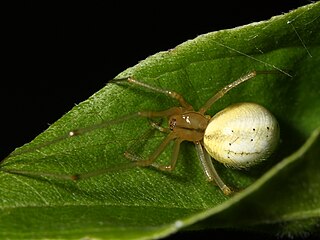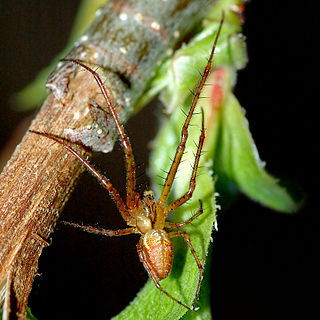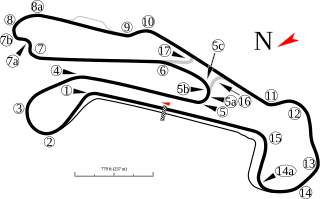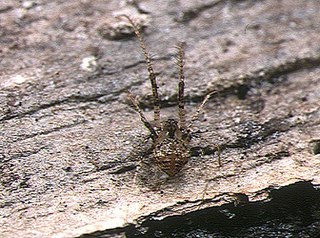
Theridiidae, also known as the tangle-web spiders, cobweb spiders and comb-footed spiders, is a large family of araneomorph spiders first described by Carl Jakob Sundevall in 1833. This diverse, globally distributed family includes over 3,000 species in 124 genera, and is the most common arthropod found in human dwellings throughout the world.

Orb-weaver spiders are members of the spider family Araneidae. They are the most common group of builders of spiral wheel-shaped webs often found in gardens, fields, and forests. The English word "orb" can mean "circular", hence the English name of the group. Araneids have eight similar eyes, hairy or spiny legs, and no stridulating organs.

Long-jawed orb weavers or long jawed spiders (Tetragnathidae) are a family of araneomorph spiders first described by Anton Menge in 1866. They have elongated bodies, legs, and chelicerae, and build small orb webs with an open hub with few, wide-set radii and spirals with no signal line or retreat. Some species are often found in long vegetation near water.

Barber Motorsports Park is an 880 acres (360 ha) racing facility in Birmingham, Alabama. It was built by George W. Barber, and includes the 230,000-square-foot (21,000 m2) Barber Vintage Motorsport Museum. It has been the site of the IndyCar Series' Grand Prix of Alabama since 2010. The Annual Barber Vintage Festival has taken place at the park each October since 2005. Barber Motorsports Park is also the home of the Porsche Track Experience.

Theridula is a genus of cobweb spiders, found in many parts of the world. Species vary in size from 1 to 3.5 mm in length.

James "Spider" Martin was an American photographer known for his work documenting the American Civil Rights Movement in 1965, specifically Bloody Sunday and other incidents from the Selma to Montgomery marches.

Rugathodes is a genus of comb-footed spiders that was first described by Allan Frost Archer in 1950. It is closely related to members of Theridion and Wamba.

Gasteracantha cancriformis is a species of orb-weaver spider. It is widely distributed in the New World.

Myrmekiaphila neilyoungi is a species of spider in the family Euctenizidae, described in 2007 by East Carolina University professor of biology Jason E. Bond and Norman I. Platnick, curator at the American Museum of Natural History in New York City. It is named after Canadian rock musician Neil Young.

Parasteatoda is a genus of comb-footed spiders that was first described by Allan Frost Archer in 1946. The name is a combination of the Ancient Greek "para-" (παρά), meaning "near" or "next to", and the theridiid genus Steatoda. The Japanese name for this genus is O-himogumo zoku.

Metepeira is a genus of orb-weaver spiders first described by F. O. Pickard-Cambridge in 1903. The name is derived from the Ancient Greek μετά and the obsolete genus name Epeira, denoting a genus similar to Epeira.

Ero is a genus of pirate spiders first described in 1836. They resemble comb-footed spiders due to their globular abdomen, which is higher than it is long.

Mimetus is a genus of pirate spiders in the family Mimetidae. They are found worldwide.

The Euctenizidae are a family of mygalomorph spiders. They are now considered to be more closely related to Idiopidae.

Nesticodes is a monotypic genus of comb-footed spiders containing only the red house spider [Nesticodes rufipes ]. It was first described by Allan Frost Archer in 1950, and has a pantropical distribution due to ship and air travel.
Allan Frost Archer, was an American arachnologist, entomologist and malacologist. He was the curator of Arachnida at the Alabama Museum of Natural History in University, Alabama. Archer was active in the latter half of the twentieth century, especially between 1940 and 1971, when he described numerous species of arachnids and snails in a number of states in the United States and elsewhere. The World Spider Catalog lists 29 genera of spiders named by Archer, of which 16 are still accepted as of September 2016.

Phylloneta is a genus of comb-footed spiders formerly considered a sub-genus of Allotheridion, and raised to genus status in 2008. The type species was first described by Eugen von Keyserling in 1884 as Theridion pictipes. As of September 2019 it contains three species and two subspecies with a holarctic distribution: P. impressa, P. pictipes, P. sisyphia, P. s. foliifera, and P. s. torandae.

Hentziectypus is a genus of comb-footed spiders that was first described by Allan Frost Archer in 1946. Originally placed with Theridion, it was moved to Achaearanea in 1955, and to its own genus in 2008. These spiders most resemble members of Cryptachaea, but are distinguished by a median apophysis that is broadly attached to the tegulum. Spiders of Parasteatoda have a median apophysis attached to the embolus, while those of Achaearanea have a hooked paracymbium on the pedipalps of males.

Kochiura is a genus of comb-footed spiders that was first described by Allan Frost Archer in 1950.

Paidiscura is a genus of comb-footed spiders that was first described by Allan Frost Archer in 1950.


















